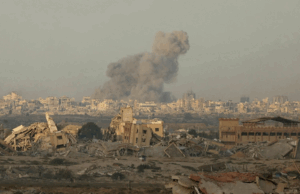Historic or symbolic? Amid state recognition, all Palestinians want is for the war to end

Smoke rises following an Israeli strike amid an Israeli operation, as seen from central Gaza, 21 September 2025
Jack Khoury writes in Haaretz on 22 September 2025:
Palestinian leaders are viewing announcements by Britain, Canada, Australia, and Portugal that they are recognizing a Palestinian state as a historic victory and an important step toward realizing the two-state solution.
Palestinian Authority Chairman Mahmoud Abbas sees the moves as giving an international imprimatur to Palestinian rights and inspiring hope of reaching a just and stable peace. He will deliver this message in a pre-recorded speech on Monday to the United Nations General Assembly. (Encouraged by Israel, the United States banned Abbas’ entry to the U.S. to deliver it in person.)
Even Hamas lauded the declarations, calling them an important step that must be accompanied by efforts to bring an immediate end to the war in the Gaza Strip.
Diplomatically, the four countries’ official declarations deal with Palestinian rights and the need to advance a two-state solution.
However, for ordinary Palestinians, the situation is more complicated. Both the young and old are contending with a war of annihilation in Gaza and, in the West Bank, with the daily realities of the occupation, settlers and an economic crisis. Israel is threatening annexation and taking measures that will lead to the collapse of the PA.
Recognition doesn’t change conditions for the Palestinian public. Many feel that the declarations are disconnected from the reality on the ground. One of them is Dr. Omar Shaban, an internationally recognized economist who was forced to leave Gaza at the start of the war. “The world keeps selling up dreams and illusions while children are being murdered, homes destroyed and the suffering continues,” he wrote on Sunday. “Recognition isn’t stopping the damage occurring on the ground and doesn’t require Western countries to change their arms purchasing, trade or sanctions policies.”
Dr. Hanan Ashrawi, a former top official in the Palestine Liberation Organization, also noted the gap between word and deed. “The recognition of Palestine by Britain, Canada and Australia, together with similar steps by other countries in the past few months, and those to come, marks a fundamental change in a world that previously defended Israel,” she said. “Now, the way has been opened for these countries to stop the genocide and take steps to punish Israel. The test is whether they will actually act. But the true absurdity is that while the [recognition] process is gaining momentum, Israel is determined to destroy Palestine and its people.”
So, alongside the official praise and Abbas’ celebratory speech, ordinary people are indifferent and often express fear for the future. They believe that the key to changing their situation doesn’t lie in declarations, but in realizing their rights on the ground – freedom of movement, self-determination in a state whose citizens will be safe, a halt to the settlements, and of course, an end to the war in Gaza.
The bottom line is that recognition of a Palestinian state is nothing more than a symbolic victory and will remain so if not followed up by concrete steps. Having learned from bitter experience, the Palestinian street is aware that positive signs do not necessarily guarantee change on the ground.
The gap between official enthusiasm and popular pessimism can only be closed if the West is prepared to use force and change policy. Otherwise, recognition will do nothing but add another layer of disappointment to the pain that has already weighed on generations.
This article is reproduced in its entirety
